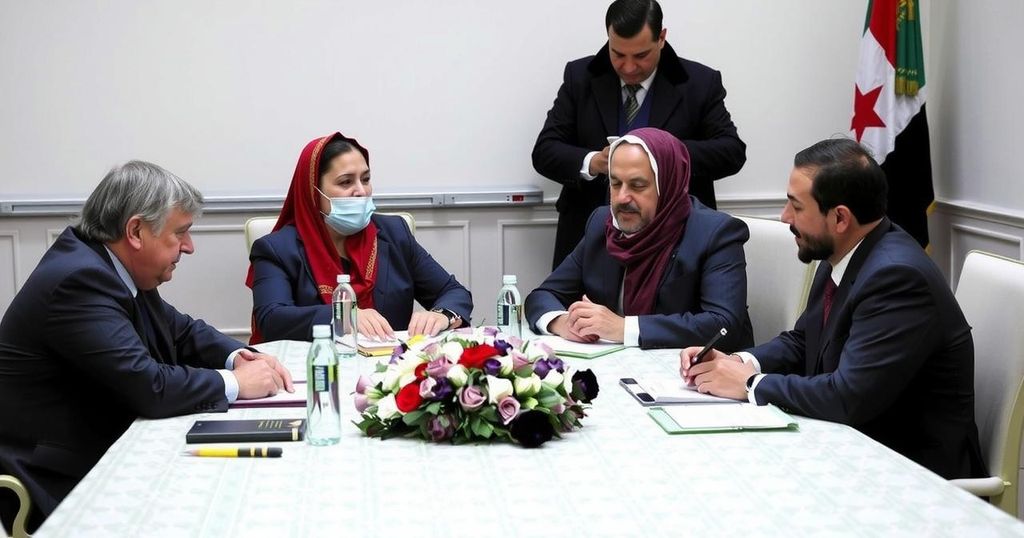Global Engagement Rises Following Syria’s Transition to New Leadership
Following the ousting of President Bashar al-Assad by Islamist-led rebels, nations are increasing diplomatic outreach to Syria’s interim government. The situation remains complex, as the leading rebel group, Hayat Tahrir Al Sham, is still classified as a terrorist organization. The international community is called to facilitate a new, inclusive administration while addressing urgent humanitarian needs amid the recent history of oppression and conflict.
Governments around the world are increasing their diplomatic efforts to engage with Syria’s interim government, which emerged following the ousting of President Bashar al-Assad by Islamist-led rebels. The swift military campaign that culminated in the capture of Damascus on December 8 has resulted in widespread celebrations among the populace, with many feeling a sense of liberation. However, the situation remains complex, as the leading group, Hayat Tahrir Al Sham (HTS), is associated with Al-Qaeda and is still classified as a terrorist organization by several nations. Diplomats are advocating for a new administration that emphasizes inclusivity and accountability in governance.
A Qatari delegation arrived in Syria, pledging support for the new regime, while Turkey has reopened its embassy—both signaling a shift in diplomatic approaches. British and American officials have stated they are maintaining contact with HTS, despite its controversial status. French diplomats plan to engage with the new authorities and assess urgent humanitarian needs, as additional support is being coordinated from Ukraine to aid the Syrian population.
The civil war, ongoing since 2011, has inflicted devastating human costs, with over 500,000 lives lost and millions displaced. As reports of the mistreatment of prisoners emerge in the wake of Assad’s regime’s collapse, calls for justice and accountability have intensified.
While a degree of calm appears to be returning to Damascus, challenges remain formidable, including the urgent need for humanitarian aid and the reconstruction of societal and economic structures. Diplomatic efforts will be critical in navigating this precarious transition and ensuring the inclusion of all ethnic and religious groups in Syria.
The international community’s reaction to these developments will likely shape Syria’s political future, particularly as nations recalibrate their strategies in light of the changing governance landscape. The recent arrests and testimonies of former prisoners underscore the importance of establishing a credible justice system that addresses past abuses.
In conclusion, while the removal of Assad from power has ignited hope and possibilities for a new beginning, the road ahead for Syria’s reconstruction and reconciliatory efforts remains fraught with challenges. The international community’s role will be pivotal in aiding Syria’s search for stability and long-term peace, ensuring that the rights and voices of all Syrians are respected.
The article discusses the recent changes in Syria following the ousting of President Bashar al-Assad amid a violent civil war that spanned over a decade. The fall of Assad’s regime has led to an Islamic group, Hayat Tahrir Al Sham (HTS), coming to power, raising concerns and prompting countries worldwide to reassess their diplomatic engagement with Syria. The international community is faced with the challenge of balancing immediate assistance with the complexities posed by HTS’s associations and the urgent needs of Syrian civilians reeling from years of conflict. The new leadership’s commitment to inclusivity and human rights will be vital in shaping Syria’s future governance and stability.
In summary, the recent transition in Syria presents a unique opportunity for rebuilding and reconciliation after years of oppression under Assad. As nations engage with the newly established government, the emphasis on justice, accountability, and humanitarian aid will be crucial. The international community’s involvement and response will ultimately determine the success of this transition and the establishment of a stable and inclusive Syria that respects the rights of all its citizens.
Original Source: jordantimes.com




Post Comment